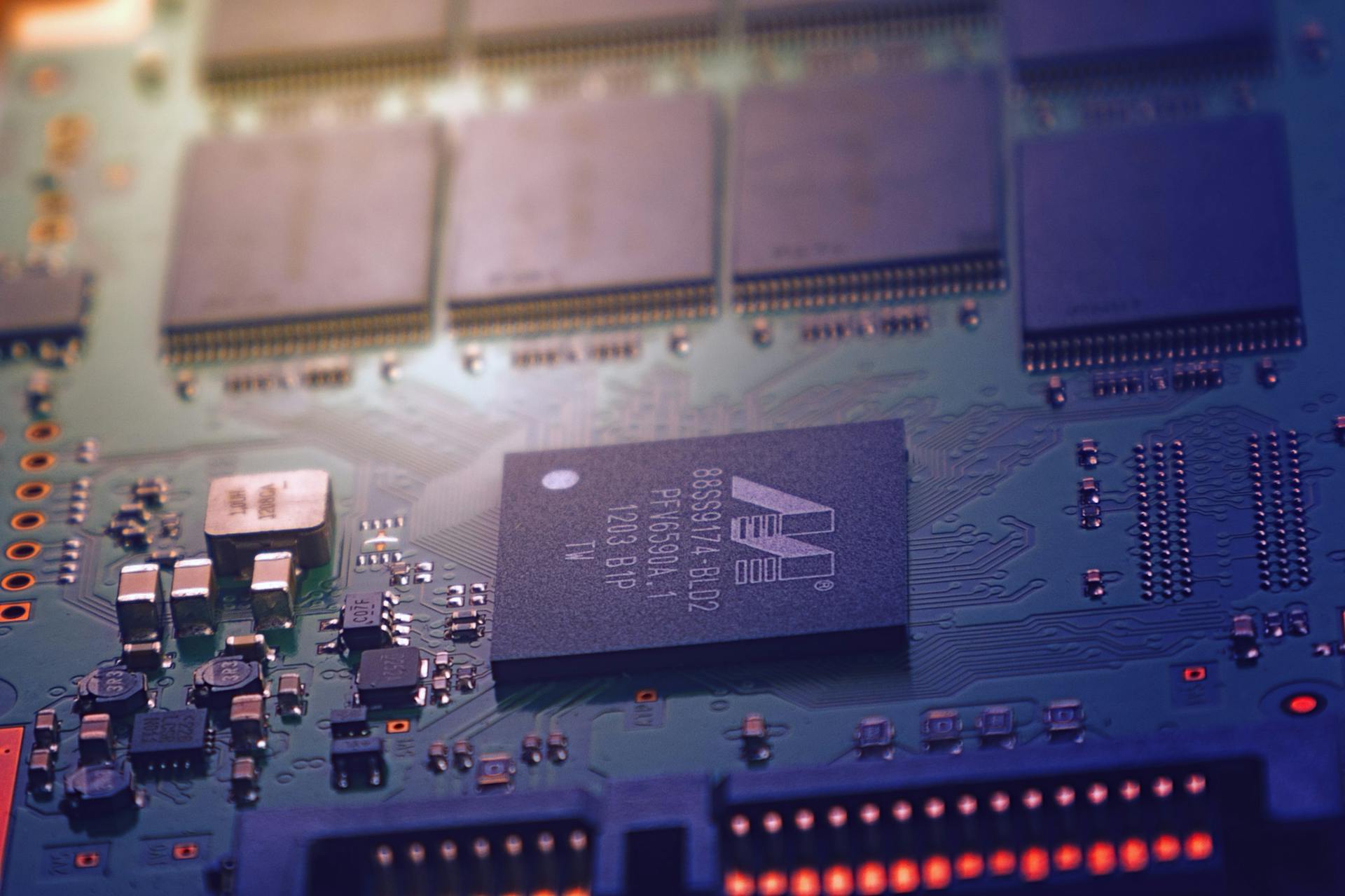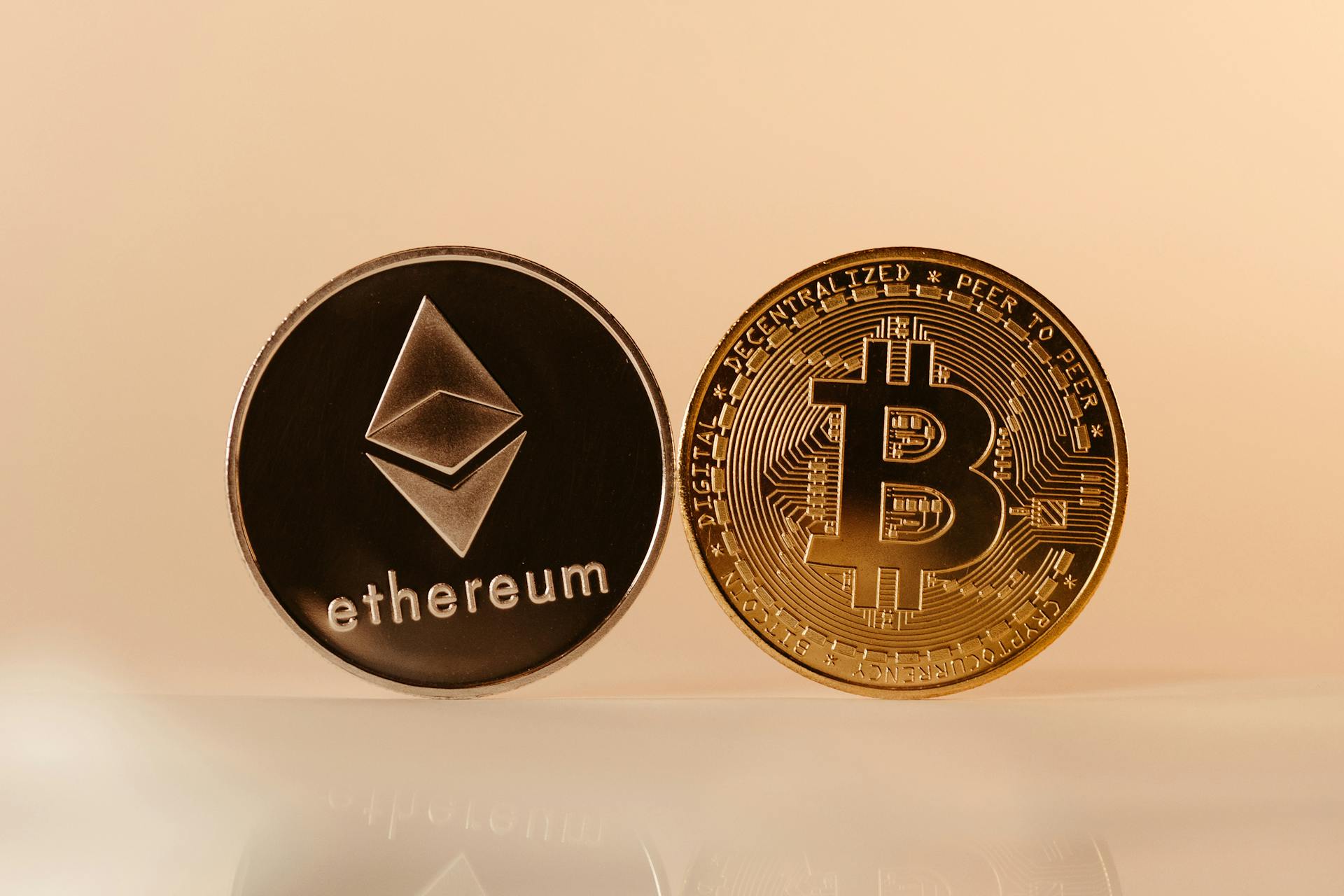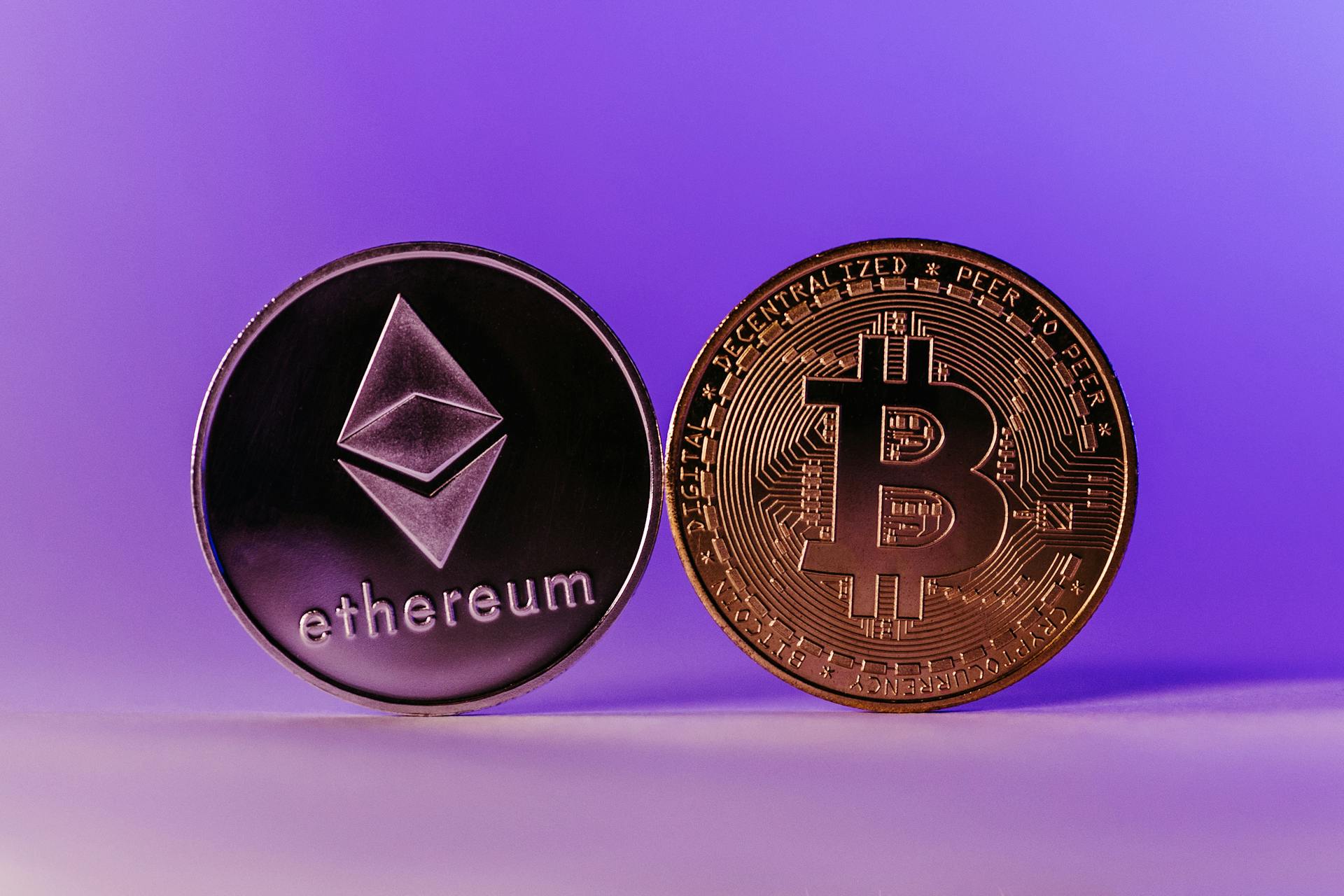
Ethereum wallets come in all shapes and sizes, catering to different needs and preferences. There's a wallet for every scenario, and I'm here to break it down for you.
For beginners, a user-friendly wallet like MetaMask is a great starting point. It's available as a browser extension and a mobile app, making it easy to manage your Ethereum assets on the go.
If you're looking for a more secure option, consider using a hardware wallet like Ledger or Trezor. These wallets store your private keys offline, making it virtually impossible for hackers to access your funds.
For those who want to manage multiple cryptocurrencies, a multi-asset wallet like Trust Wallet is a great choice. It supports over 20 different cryptocurrencies, including Ethereum, and is available on both desktop and mobile devices.
A unique perspective: Digital Wallet vs Mobile Wallet
What Is an Ethereum Wallet?
An Ethereum wallet is a digital interface that enables you to manage your Ethereum-based assets, execute transactions, and engage with decentralized applications (dApps). It's a powerful tool for navigating the Ethereum blockchain.
Your Ethereum wallet is essentially a software that allows you to operate crypto tokens, storing or creating them, and sending them to others. It's a place where you can keep track of your Ethereum holdings in one place.
Your wallet is identified by a public address, which is similar to an email address, consisting of a large number of letters and numbers. This address is used by others to send you coins or buy tokens from you.
The second part of your Ethereum wallet is the private key, a cipher that you enter every time you need to access the program. This key is a secret code that identifies your Ethereum coins as your personal property.
You can store your Ethereum wallet on your computer or mobile device, giving you access to your coins whenever you need them. There are also hardware Ethereum wallets that are not connected to the internet, providing an additional layer of security.
Here are some key functions that your Ethereum wallet can perform:
- Send Cryptocurrencies
- Receive Cryptocurrencies
- Trade Cryptocurrencies
- Spend Cryptocurrencies
- Withdraw Cryptocurrencies
Your Ethereum wallet has two important keys: a public key and a private key. The public key is linked to your wallet address, allowing others to send you coins, while the private key is the password to your wallet, granting you total control over the contents.
Discover more: Private Crypto Wallet
Types of Ethereum Wallets
There are several types of Ethereum wallets to choose from, each offering a unique balance of convenience and security.
Physical hardware wallets keep your crypto offline, providing top-notch security. Mobile applications allow you to access your funds from anywhere, but may not be as secure as other options. Browser wallets are web applications that let you interact with your account directly in the browser.
Browser extension wallets are add-ons you download to interact with your account and applications through the browser.
For another approach, see: Ethereum a Security
Types of
Types of Ethereum wallets are designed to balance convenience and security, and there are several options to choose from. Physical hardware wallets, for example, are devices that let you keep your crypto offline – very secure.
Mobile applications make your funds accessible from anywhere, but they may not be the safest option since they run the risk of being hacked. Browser wallets are web applications that let you interact with your account directly in the browser, and browser extension wallets are extensions you download that let you interact with your account and applications through the browser.
Hot wallets can store your private keys online, making them accessible to you from virtually any part of the world on the condition that you have an Internet connection. Cold wallets, on the other hand, are always non-custodial and enable you to store the keys offline, making them much more reliable and less susceptible to hacker attacks.
Ethereum addresses and accounts can be categorized into two types: externally owned accounts (EOAs) and contract accounts. Externally owned accounts, or EOAs for short, are the most common type of Ethereum accounts, having an Ethereum address that is managed by a private key.
Here are the main types of Ethereum wallets:
- Physical hardware wallets (e.g. Ledger devices)
- Mobile applications
- Browser wallets
- Browser extension wallets
- Custodial wallets (managed by a third party)
- Non-custodial wallets (give you complete control over your private keys)
Multi-Chain Support
Best Wallet is a great example of a multi-chain wallet that allows users to buy a diverse range of crypto assets, including cryptos and NFTs. This is a game-changer for those who want to invest in multiple assets without having to switch between different wallets.
One of the key benefits of a multi-chain wallet is that it supports a wide range of cryptocurrencies. Best Wallet, for instance, supports over 1000 crypto assets, making it a one-stop-shop for all your crypto needs.
Here are some of the key features of a multi-chain wallet like Best Wallet:
- Multi-chain support: allows users to buy and store multiple cryptocurrencies in one place
- Supports 1000+ crypto assets
- Allows users to interact with multiple decentralized applications
This level of flexibility and convenience makes multi-chain wallets like Best Wallet a popular choice among crypto investors.
Software and Mobile Wallets
Software and mobile wallets are a popular choice for Ethereum management, offering a user-friendly approach to crypto management. They're free, easy to download, and allow you to set up HD wallets with multiple accounts.
These wallets often provide instant access to blockchain services, enabling users to engage with smart contracts and decentralized applications (dApps) directly. However, software wallets store private keys on the host device, making them vulnerable to malware and spyware.
Mobile Ethereum wallets are a type of software wallet designed specifically for smartphones and tablets. They typically have intuitive interfaces and accessibility, making them convenient for everyday purchases or real-life use. However, mobile wallets can be hacked if someone knows your phone's PIN.
On a similar theme: My Mobile Wallet
Mobile wallets are often referred to as "light" clients, as they don't require a complete download of the blockchain. This makes them more straightforward to use but less protected from hacker attacks.
Some popular Ethereum software wallets include MyEtherWallet, Infinito Wallet, and MetaMask. These wallets are more secure than exchange wallets but still connected to the internet, making them less safe than hardware wallets.
Here are some key characteristics to consider when choosing a software wallet:
- Code should be open-source to allow for community testing and validation
- User-friendly interface for easy sending and receiving of Ether
- Private key control, reducing the risk of being hacked
Mobile wallets, on the other hand, are convenient for daily use but less secure. They're often used for storing small sums of Ether, and it's recommended to store only what you need for everyday purchases.
Some popular mobile Ethereum wallets include Binance Wallet and Jaxx, which support multiple cryptocurrencies and have user-friendly interfaces. However, these wallets can be hacked if someone knows your phone's PIN, so it's essential to keep your private keys and passwords safe.
In summary, software and mobile wallets offer convenience and accessibility but require careful consideration of security risks. Always prioritize security and usability when choosing an Ethereum wallet.
Discover more: What Is Mobile Wallet App
Security and Backup Options
Security and Backup Options are crucial when choosing an Ethereum wallet.
Software wallets are vulnerable to online threats like malware and spyware, so it's best to store your private keys offline using paper wallets or hardware wallets.
Hardware wallets like Ledger devices store private keys offline in a secure element chip, protecting them from online threats.
To create an extremely secure backup, consider purchasing a second Ethereum hardware wallet to import the same accounts onto. This way, you have two devices that allow you to access the same accounts.
Some wallet providers offer services to help you manage your wallet backup, such as Ledger Recover, a paid optional service that can help you secure a backup and access it whenever you need using just your identity.
Trezor, another top Ethereum wallet provider, allows users to hold their private keys and sign transactions without connecting to the internet, eliminating any form of unauthorized access to users' assets.
Readers also liked: Online Bitcoin Wallet
To keep your seed phrase safe, consider using a durable and secure storage option like Cryptotag, which is built with titanium and offers high security and affordability.
Two-factor authentication (2FA) is also an effective way to boost your security, especially for custodial wallets, by requiring a numerical code sent to a mobile device in addition to a password.
Remember, Ethereum wallets do not store ETH, but rather the private keys needed to control your Ethereum accounts. To store ETH, you must move it to an account managed by a private key you control.
Here are some key security and backup options to consider:
- Hardware wallets like Ledger and Trezor
- Backup hardware devices
- Two-factor authentication (2FA)
- Cryptotag for secure seed phrase storage
Popular Ethereum Wallets
There are many great Ethereum wallets to choose from, but some stand out from the rest. Ledger devices, for example, offer a secure way to access the Ethereum ecosystem.
Ledger Ethereum wallets are multi-faceted, allowing you to secure and manage ETH and Ethereum tokens such as memecoins, stablecoins, NFTs, and more. They also offer a wide range of Ethereum apps and services that each benefit from Ledger's clear signing plugin.
Some popular Ethereum wallets include Ledger Nano S, Trezor, MyEtherWallet, Exodus, Jaxx Liberty, and imToken Wallet. Each of these wallets has its own unique features and benefits.
Here are some key features of these popular Ethereum wallets:
These wallets offer a range of benefits, from security and ease of use to a wide selection of supported cryptocurrencies.
Ledger
Ledger offers a range of Ethereum wallets that provide top-notch security and ease of use. Ledger devices support Ethereum, ERC-20 tokens, and other cryptocurrencies, including Bitcoin, Litecoin, and more.
Ledger's Ethereum wallets are multi-faceted, allowing you to secure and manage ETH and Ethereum tokens such as memecoins, stablecoins, NFTs, and more. With Ledger Live, you can buy, sell, swap, and stake ETH with ease.
Ledger's flagship wallet is the Ledger Nano X, which supports all tokens on the Ethereum blockchain and includes features such as a battery and Bluetooth for increased mobility. The Ledger Nano X also allows you to install up to 100 apps at the same time, supporting 1800+ different tokens.
Some of the key features of Ledger's Ethereum wallets include:
- Multi-faceted support for Ethereum, ERC-20 tokens, and other cryptocurrencies
- Easy-to-use interface with Ledger Live
- Support for up to 100 apps on the Ledger Nano X
- Increased mobility with battery and Bluetooth on the Ledger Nano X
Ledger's Ethereum wallets are a great choice for those looking for a secure and user-friendly way to manage their Ethereum assets.
Bybit A Beginner-Friendly
Bybit is a beginner-friendly Ethereum wallet that offers a range of features to help new users get started with cryptocurrency trading.
Bybit's user interface is designed to be easy to use, making it perfect for those who are new to the world of cryptocurrency.
Bybit supports over 100 cryptocurrencies, according to CoinMarketCap, giving users a wide range of options to choose from.
The platform also supports both fiat and crypto payments, making it easy to buy and sell cryptocurrencies.
Bybit offers margin trading with up to 10x leverage, which can be a great way for experienced users to maximize their gains.
Here are some of the key features of Bybit's Ethereum wallet:
- Over 100 cryptocurrencies supported
- Supports both fiat and crypto payments
- Over 300 spot trading pairs
- Beginner-friendly UI
- Easy to use Ethereum-wallet
Bybit's wallet also gives users access to a range of other features, including market overviews, NFT marketplaces, and staking facilities.
Exchange and DeFi Wallets
Exchange and DeFi wallets offer a convenient way to store and manage your cryptocurrencies. They often come with a user-friendly interface and a wide range of features to help you manage your assets.
One popular example of an Exchange and DeFi wallet is Crypto.com, which supports storing over 500 crypto assets, including Defi coins like Yearn Finance and Uniswap. You can also store ERC721 and ERC1155 token-based non-fungible tokens with this wallet.
Crypto.com also allows you to buy almost 100 cryptocurrencies with a credit card or debit card, making it a great option for those new to the world of cryptocurrencies. The wallet is free to use, but you'll need to pay transaction fees for swapping or buying cryptocurrencies.
Here are some key features of Exchange and DeFi wallets like Crypto.com:
- Full control over your private keys.
- Strong security features, including 2FA, Passcode, and Face ID.
- Ability to select network fee and transaction confirmation speed.
- Support for 500+ assets, including crypto, stablecoins, and NFTs.
- Ability to import Metamask, Ledger, and MyEther Wallet wallets.
- Provides buying crypto with bank cards.
- Provides secure access to several Defi projects.
Bread
Bread is a mobile wallet that's easy to get started with, allowing you to start trading in just a few minutes after downloading the app.
It initially only supported Bitcoin (BTC) but has recently added Ethereum (ETH) tokens, giving users more options.
A simple interface makes it easy to navigate and use, making it a great choice for those new to cryptocurrency trading.
Security is average, so users should still take necessary precautions to protect their accounts.
Exchange vs Software
When choosing between an exchange wallet and a software wallet, it's essential to consider the trade-offs between security and convenience.
Exchange wallets are convenient because they allow you to store your cryptocurrency on the exchange itself, but they're not as secure as other options.
You're better off with a software wallet if you plan to use your cryptocurrency for everyday transactions. Software wallets store Ethereum on your phone or computer, making them more secure than an exchange wallet.
However, software wallets are still connected to the internet, so they're not as safe as hardware wallets. If you're looking for long-term storage, a hardware wallet might be a better choice.
Some popular software wallets include MyEtherWallet, Infinito Wallet, and MetaMask.
These wallets offer a balance between security and convenience, making them a great option for users who want to control their private keys.
For your interest: How to Store Bitcoins
Crypto.com DeFi Crypto
Crypto.com is one of the best Ethereum wallets in terms of security and versatility. It uses Secure Enclave technology to encode private keys on your device, providing an extra layer of safety.
With Crypto.com, you can store almost 500 crypto assets, including popular coins like ETH and BTC, several ERC20 tokens, Defi coins, and multiple stablecoins. You can also store ERC721 and ERC1155 token-based non-fungible tokens.
Crypto.com's Defi Earn tool allows you to deposit your tokens and earn rewards. This is a great way to grow your assets and earn passive income.
Here are some of the key features of Crypto.com's DeFi crypto wallet:
- Full control over your private keys.
- Strong security features, including 2FA, Passcode, and Face ID.
- Ability to select network fee and transaction confirmation speed.
- 500+ assets supported, including crypto, stablecoins, and NFTs.
- Ability to import Metamask, Ledger, and MyEther Wallet wallets.
- Provides buying crypto with bank cards.
- Provides secure access to several Defi projects.
This wallet is not only about storing your coins, but also about buying, selling, growing, and swapping your assets.
Features and Functionality
When choosing an Ethereum wallet, it's essential to consider its functionality and features.
You should check if the wallet supports the coins you have invested, as some wallets may only support a limited number of cryptocurrencies. Make sure it supports all the coins you have.
The platform's opportunities are also crucial, as you may want to trade, stake, or lend your coins to earn interest. Some wallets may offer these features, while others may not.
Functionality

When choosing a cryptocurrency wallet, consider the functionality it offers. This includes the number of coins it supports, so you can store all your investments in one place.
Make sure the wallet supports the specific cryptocurrencies you have invested in, such as Bitcoin or Ethereum. Diversifying your portfolio is a good idea, and a wallet that supports multiple coins can help you achieve this.
Apart from storing coins, you may want to trade, stake, or earn interest on your investments. Look for a wallet that supports these functions to get the most out of your cryptocurrency holdings.
A good Ethereum wallet should also support staking and earning interest, among other functions. This will allow you to maximize your returns and get the most out of your investment.
In addition to storing and trading coins, consider a wallet that allows you to store your private keys offline for added security. This is especially important if you plan to secure a sum of ETH long-term.
Contract Accounts
Contract accounts are a unique type of account in Ethereum that doesn't have a private key, so they can't be controlled by a single individual.
Every contract account has a unique Ethereum address, just like externally owned accounts (EOAs).
Contract accounts can receive and send Ether, which is the cryptocurrency used in the Ethereum network.
They can also launch additional contract accounts, but only if they've been pre-programmed to do so.
It's worth noting that contracts cannot be altered after they've been designed, so the creator must be careful and consistent when drafting conditions for each trigger.
ETH Transactions
Sending and receiving ETH is a straightforward process that requires a basic understanding of how Ethereum transactions work.
To initiate a transaction, you need to use your wallet's interface to confirm the transaction, which involves signing it with your private key and transmitting it to the blockchain.
To receive ETH, you'll need to share your unique blockchain address with the sender, which is derived from your public key and serves as a one-of-a-kind identifier for your account.
Each Ethereum account has its own distinct blockchain address, making it easy to track and manage transactions.
Your Ethereum wallet generates your public key, which is used to create a unique blockchain address for your account.
Additional reading: Ethereum Transaction
Choosing and Creating a Wallet
Choosing a wallet depends on how often you plan to use it and for what purposes. Your choice of an Ethereum wallet will be different from someone else's.
You can choose between custodial and non-custodial wallets. Custodial wallets require setting up login details and undergoing a KYC process. Non-custodial wallets, on the other hand, provide a secret recovery phrase and allow you to download and install the interface on your device.
To create an Ethereum wallet, you'll need to set up a new account, which will generate key pairs for each new account you create. Your private key is like a secret password to your account, while the public key is like your account's address or ID.
Additional reading: Create Ethereum Wallet
Compatibility
When choosing a wallet, compatibility is a crucial factor to consider. Most good software wallets are compatible with iOS, Android, Windows, Mac, and Linux devices.
You should check the compatibility of the wallet you're interested in to ensure it works with your device.
The desktop app may be more convenient for some users, while others may prefer the mobile app.
Make sure to check the compatibility of the wallet before making a final decision.
Creating an
Creating an Ethereum wallet is a straightforward process, but it depends on the type of wallet you choose. You can opt for a custodial or non-custodial wallet.
Custodial wallets require you to set up login details, such as an email address and password, and may also force you to undergo a KYC, which involves showing your government identification.
Non-custodial wallets, on the other hand, offer more flexibility and security. With a software wallet, you'll need to download and install the interface on your device, while a hardware wallet requires buying the device and installing its companion software.
Both non-custodial wallet types will provide you with a secret recovery phrase, a string of 12-24 English words that will allow you to restore your wallet using any HD wallet provider.
You'll need to create a new Ethereum account to send and receive ETH and Ethereum tokens, and your wallet uses your SRP to generate key pairs for each new account you create.
The private key is like a secret password to your account, giving you control, while the public key is like your account's address or ID, letting the world know where to send your Ether.
A different take: Software vs Hardware Wallet
Reviews and Comparison
Reviews and Comparison is where things get really interesting. We've already taken a look at the best Ethereum wallet providers, but now it's time to dive into the details of what makes each one great.
The reviews we've done on these wallets show that they all have their own unique strengths and weaknesses. For example, some wallets offer advanced security features, while others are more user-friendly.
In our reviews, we've found that some wallets are better suited for beginners, while others are more geared towards experienced users.
CoinStats
CoinStats is a multi-functional wallet that's both secure and easy to use. It allows users to manage all their assets from one spot.
The wallet offers the opportunity to swap on Ethereum, BSC, and Polygon with zero extra fees. This feature is especially convenient for those who want to switch between different blockchain platforms without incurring additional costs.
CoinStats' intuitive interface makes it well-suited for novices and mobile-first users. Its user-friendly design ensures that even those new to cryptocurrency can easily navigate the wallet and manage their assets.
The wallet also offers the ability to buy, sell, and earn on crypto assets. This feature allows users to take advantage of various investment opportunities and grow their cryptocurrency portfolio.
Explore further: Cryptocurrency Ethereum
Cost

You can get a software wallet for free, but be aware that you'll still need to pay attention to the transaction fees they charge.
Hardware wallets, on the other hand, need to be bought upfront, but they're a worthwhile investment if you're serious about keeping your crypto safe.
The cost of a hardware wallet can range, but a Ledger device, for example, costs $79.
If you're a frequent trader, a software wallet might be more convenient for you, as you won't have to worry about the upfront cost of a hardware wallet.
Take a look at this: Phantom Wallet Hardware Wallet
Final Thoughts
Ethereum wallets are a crucial part of the Ethereum ecosystem, providing users with a secure way to store, send, and receive Ether and other digital assets.
Choosing the right Ethereum wallet depends on your specific needs and preferences, but it's essential to consider factors like security, user-friendliness, and compatibility with your device.
Some wallets, like MetaMask, are browser extensions that can be easily installed and used, while others, like Ledger Live, require a separate device to be set up.
In terms of security, wallets like Trezor and Ledger offer high-level protection through their hardware-based approach.
Ultimately, the best Ethereum wallet for you will depend on your individual needs and preferences, but it's essential to do your research and choose a wallet that aligns with your goals.
Frequently Asked Questions
Is Kraken an Ethereum wallet?
Kraken Wallet is a self-custody Ethereum wallet that securely stores and manages ETH assets and NFTs. It's a dedicated Ethereum wallet solution for storing and managing your Ethereum-based assets.
How do I withdraw money from Ethereum wallet?
To withdraw money from an Ethereum wallet, you can use a crypto exchange or peer-to-peer platform to convert your crypto to cash. Simply select the coin and amount to sell, agree to the rates, and your cash will be available.
Is there a free Ethereum wallet?
Yes, a free Ethereum wallet is available as a mobile app that can be downloaded from the Google Play or App Store.
Featured Images: pexels.com


